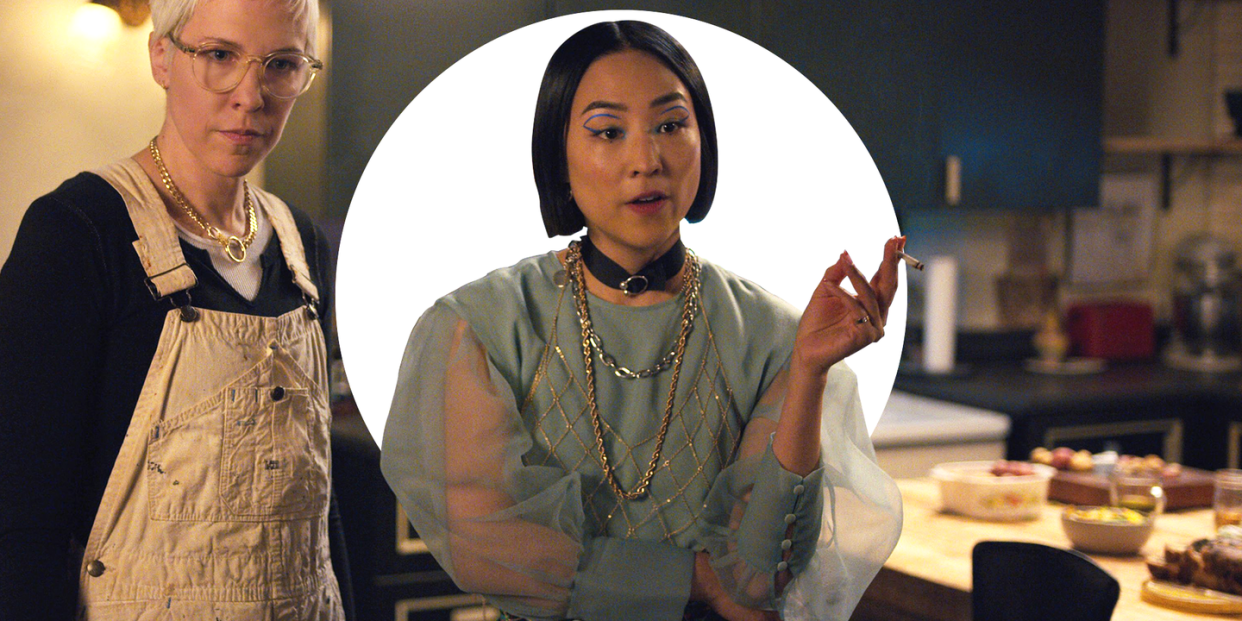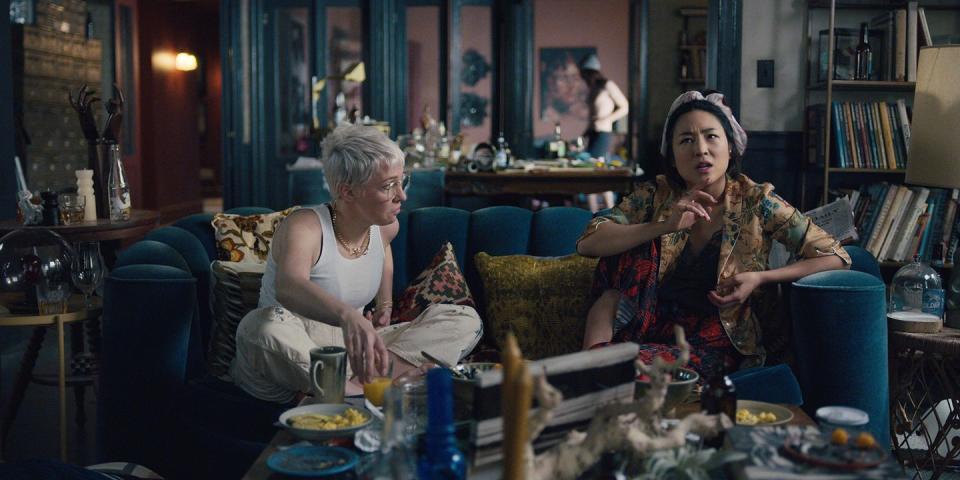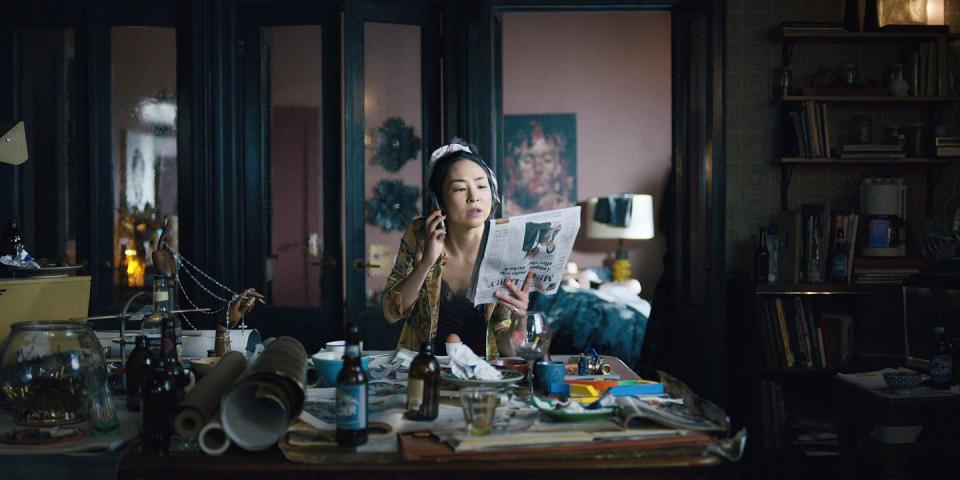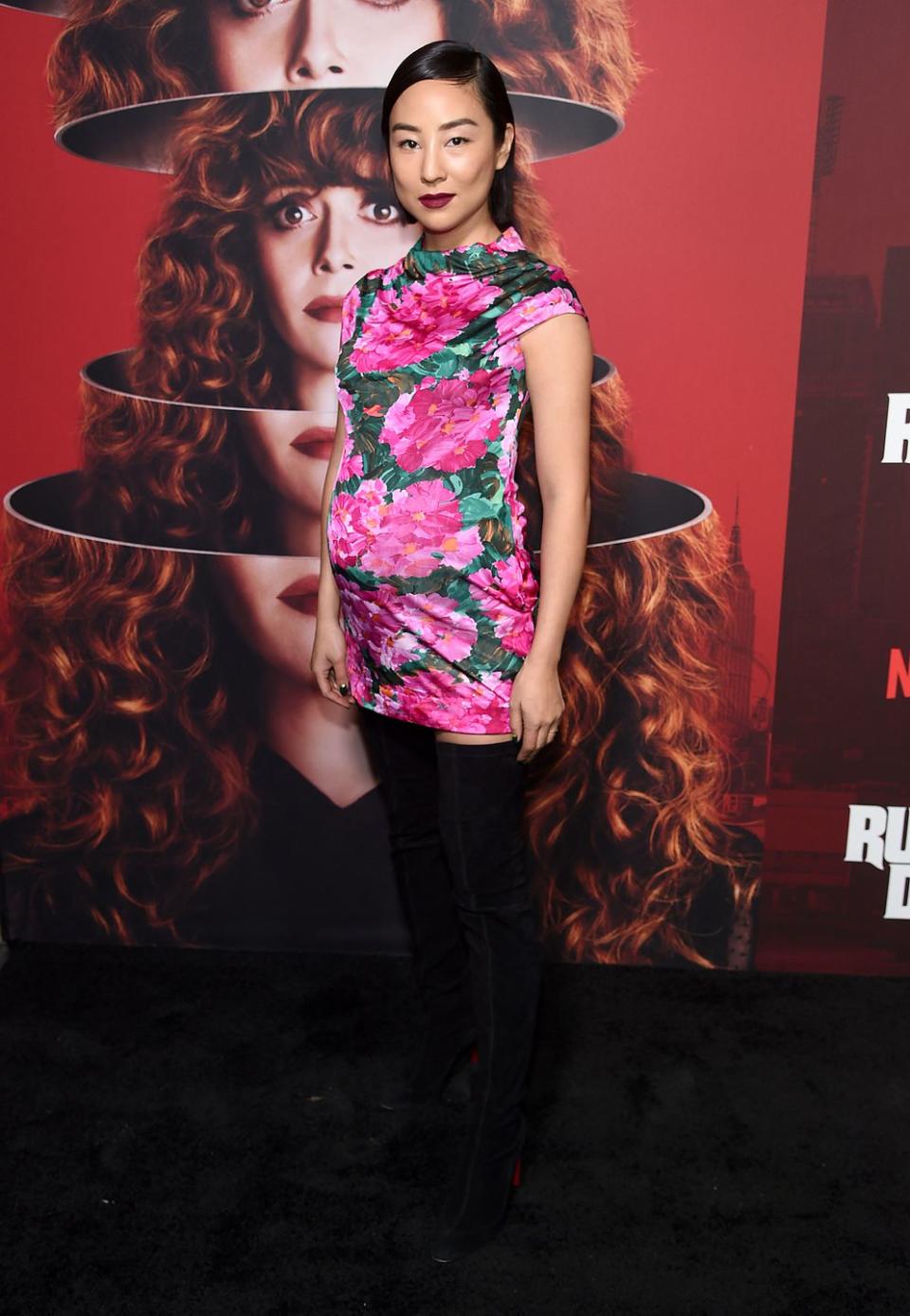Greta Lee Is the Best Friend You Always Wanted

In Russian Doll, Netflix’s addictive dark comedy starring Natasha Lyonne as a woman who keeps dying and returning to her 36th birthday party, Greta Lee plays Maxine, the ultimate ride-or-die chick-the friend who’s always got the good weed and won’t ask any questions if you absolutely must leave her apartment through the fire escape. She’s the first person Nadia (Lyonne) sees every time her increasingly bizarre time loop resets itself, and it’s kind of great, because who wouldn’t want to begin such a horrifying, cyclical experience with your bestie immediately passing you a joint and anointing you the “sweet birthday baby”?
But as the cynical yet surprisingly heartfelt series progresses, Nadia’s journey becomes bleaker and bleaker, just as she realizes her friendships, including with Maxine-adorned in killer puffy teal sleeves and royal blue eyeliner, blissfully wallowing in her own timeline of nostalgia-are more vital than ever. The series confronts old wounds, the choices we make, the forgiveness we allow ourselves, and a deep yearning for the opportunity to do it all over again. And in case you haven't added it to your queue yet (really, what are you waiting for?), Russian Doll is created, written, directed by, and stars mostly women, with Leslye Headland, Amy Poehler, and Lyonne sharing co-creator credits.
Lee opened up to BAZAAR.com about replaying the same scene over and over and over, capturing the authenticity of female friendships, and the power of nostalgia and self-reflection.
Harper’s Bazaar: What drew you to Maxine and Russian Doll?
Greta Lee: First of all, the people involved. At the time, it wasn’t announced that it was going to be an all-female creative writing and directing team, but I knew that I loved working with Natasha and Amy previously on a different project years ago called Russian Doll. It was a failed pilot for NBC, and we joked that it sort of planted the seed for this show. This is a much darker, edgier version of that show in some ways. It’s almost comedically much darker than the pilot we put together years ago. But I loved working with Natasha because she is entirely herself while also honoring the character that she’s playing. She requires a certain amount of focus and honesty from scene partners, which is a really great way to work. I tell her sometimes that it’s impossible to lie to her as a performer, which is a quality that I find really rare and refreshing. Then I read the script and said, "Oh wait, never mind. I don’t want to do this. I take it all back. I love you, but no thanks." [Laughs]
A post shared by Greta Lee (@thegreta) on Apr 4, 2019 at 2:40pm PDT
HB: Really? Why?
GL: Because I was intimidated by the idea of time loops, this character who was going to be stuck at a party, and the challenge as an actor to repeat the same lines again. I almost felt like this was actor’s suicide. How am I going to pull this off in an honest way? We had some conversations about that. I think she joked, "Greta, it’s going to be a really short shoot. We’ll just keep using the same thing over and over again," which obviously isn’t true. But ultimately, this project from the beginning seemed so special in its ability to take on these huge themes-everything from addiction to mental health to female friendships-in a very full, multidimensional way. The idea that if you could go back and reset and do it again, what would you do? To do all of these things in a very funny way was ultimately the biggest draw for me. It really was funny on the page.
"I find it so unrealistic to categorize humor and tragedy in an isolated way … Often the saddest moments are also somehow funny."
HB: It seems for Maxine especially that she gets progressively darker as Nadia’s loops progress. Her humor is darker and she becomes more and more deadpan.
GL: Yes, and it’s all because of Natasha and Leslye and Jamie Babbitt too, our director. They really made it a point to sit down and figure out where Nadia was coming from and which loop she was in. The way they did it was like a sci-fi film. It became a very heady, detailed way of working in terms of, Okay, which loop is she in right now? and Where exactly did she just come from? So it felt like we were honoring that as opposed to, Okay, this is the same thing. They were trying to treat each loop like its own movie, in a way.
HB: I can see that, while it also intertwined the humor and irony that is so indicative to New Yorkers.
GL: Yes, that was really important to us. I find it so unrealistic to categorize humor and tragedy in an isolated way, because that is not how I experienced my own life. Often the saddest moments are also somehow funny. I’m so glad that we were all on the same page in terms of the tone. I think they really nailed the absurdity of life. I love that Maxine is a good friend. So often we’ve seen women who are just terrible friends to each other. I felt like in Russian Doll, they were very real with each other and actually friends. And friends can be shitty to each other. But there is a genuine love that is the undercurrent to everything that’s happening to them that felt precious and rare. I think that’s because there are so many ladies around [on the creative team].

HB: Yes, the complexities of female friendships are so very specific. You can certainly tell that women wrote this because you recognize your own relationships in this dialogue.
GL: I can’t say that it’s something I’ve really understood or appreciated in the moment. It’s more like a rearview experience of looking back and realizing, Oh, my God, yes! It does take so much energy sometimes with an all-male team, which is sadly the norm. It’s wasted resources. And it’s on me, too, my own automatic insecurity about taking up space on the job. With comedy, it requires a lack of self-consciousness to make things happen. Being able to skip that was just a huge gift. It makes the work better and things move faster.
We had time to really look at scenes. There was one where we were sitting around and we realized, "Why are they talking about whether or not Maxine has a boyfriend. Like, who cares?” [These characters] wouldn’t do that. And then it was changed to talking about religion and sex cults. It’s so much more interesting. I think Rebecca [Henderson, who plays Maxine and Nadia’s friend Lizzy], Leslye, Natasha and I all have a theater background, so we’re able to pick that apart and realize this is so not realistic and change it. I don’t think that an all-male team would be able to do that.
"There is a genuine love that is the undercurrent to everything that’s happening to them that felt precious and rare."
HB: There are many ways that the series highlights the complexities of female experiences. For instance, memory and nostalgia play significant roles in Nadia’s life as well as Maxine’s. Maxine’s style-including her clothes, makeup, and apartment-is very vintage. At one point, she’s even reading the newspaper and “reflecting on her life.”
GL: We talked a lot about being an old soul and a part of this crew of people who’d been around, living and working in New York, getting older and what that is like, and what happens when the world around them is changing rapidly. Maxine is in the art world. It seems like she comes from some amount of wealth to be able to afford to live there. But with the clothes, our costume designer, Jennifer Rogien, is such a genius. We had a lot of conversations about what Maxine would wear to a party like this. There are so many different ways she could have gone. Whenever we put on anything too fashion-y, it somehow didn’t work. We wanted to suspend trend in a way because she’s just such her own creature, which is why we ended up with this mix of jewelry and trash fashion.

HB: And it totally works for her. It also manages to still align with Nadia’s throwback all-black attire.
GL: There’s a version of a scene that [had dialogue that included] something about how your closest friends are a mirror of yourself. They reflect back to you a version of yourself at that time, which I loved thinking about-how Maxine can match what Nadia is going through and is able to recognize things that maybe Nadia can’t see herself. I thought that was really interesting and true and something I’ve experienced in my own life.
HB: Did playing Maxine make you feel nostalgic for a moment in your own life?
GL: Yes! The show made me think a lot about when I first moved to the city-the country mouse Greta who came here almost 15 years ago who lived and worked in the East Village. I can’t pretend 15 years ago was real New York, though. Gentrification had already started rolling through. I have a profound nostalgia for the years that I was waiting tables at Momofuku [Noodle] Bar, and living two blocks down in the tiniest most expensive studio apartment. I was just bleeding money. But I just wanted to live in New York. At the time, I think I was joking I was living my Sex and the City fantasy/lie, losing money to cosmopolitans in this pretend life of awesomeness. Maxine’s home is in the East Village and I think we shot all of our locations in that area. I miss those years a lot and I know Natasha does too.
HB: Getting back to time loops, how has motherhood shaped the way you look at your life and monotony?
GL: It’s just sucked everything up! It’s funny talking about friendships and mirrors of yourself, because having a kid and seeing yourself reflected back to you in a form of a child-all the good things and the bad things-is a very humbling, profound experience. In my previous life, I was not a ritualistic person. I was living in the East Village, waiting tables, and had no schedule. I was living entirely for myself, for better or for worse. Now that’s completely gone. I go to the church of scheduling. I live by schedules and timelines and happily so. The loop of my life is centered around a very present roommate who eats up a lot of our food, takes up a lot of space, is very loud, and doesn’t clean up after himself. It’s very disorienting to experience life this way, I have to be honest. It’s something that I am still processing as I go, mid-loop.
A post shared by Greta Lee (@thegreta) on Mar 30, 2019 at 11:00am PDT
HB: And you don’t have “Gotta Get Up” by Harry Nilsson playing on loop to give you a good beat to jam to in the process.
GL: That song. [Laughs] Do you know how many times we listened to that song? You guys think you’ve listened to that song a lot. We were actually listening to that song the whole time in those dance scenes. We had to keep setting it to the beginning so everyone can move to the same beat. It would be weird if everyone started dancing to their own made-up song.
HB: One loop I can’t get out of my mind is the scene toward the end when Maxine is dancing by herself and there’s no one left at the party. It made me think-and this is getting dark again-whether in the end we’ve only got ourselves and our decisions. Do you believe that’s true?
GL: Yes! I think my parents did a good job instilling that at the end of your days, you only have yourself-now that I think about it, this is a weird thing to say to your kids at such a young age. You only have the relationship you have with yourself, whether you like it or not. So, be sure to tend to that relationship, because that’s it. That scene makes you think not only about the end of your natural life, but also in terms of addiction and losing people to something like addiction or mental health [issues]. That was really at the emotional core of those moments for me-how people close to you can fade in and out [of your life] because of illness, mistakes that we make, or because of life. And I’d love to be dancing alone at my own party smoking a cocaine-laced joint by myself. How wonderful.
"You only have the relationship you have with yourself, whether you like it or not. So, be sure to tend to that relationship, because that’s it."
HB: Do you consider Maxine to be happy? From one minute to the next, she can radiate pure joy or utter darkness, like when she says, “If no one eats my chicken, I’m going to kill myself.” Completely deadpan, of course.
GL: I think she’s someone who gets a lot of happiness out of her artwork and her friendships. That’s tricky. I don’t know how happy she is. I think she is a curious mind and someone who defines happiness through her work and through the people in her life, which is kind of interesting. I think she’s someone who has a lot, in terms of the people around her, and has a very full life. But what makes her interesting to me is that underneath all that, she’s sort of figuring it all out.

HB: What can you tell me about your upcoming series, KTown?
GL: I can’t really tell you much. All I can say is that Jason Kim and I are working with Annapurna Pictures and HBO on a dark comedy that takes place in Koreatown, Los Angeles. We are writing. We are excited. It’s become clear that there is a gaping hole in terms of Asian Americans being represented on TV and in film. We’re happy to tackle it and hopefully make a show that people will want to watch. That’s all I can say right now, but more to come. It’s all very exciting.
('You Might Also Like',)

